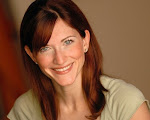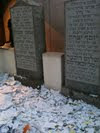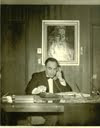B"H
I really have been enjoying Matthue Roth's work (which I find on Facebook, My Jewish Learning, and his blog). His writing has really inspired me in the time I have been doing the Jewish content for Patheos. In fact, his article on Molly Goldberg + the interview with Aviva Kempner on NPR got me researching and ultimately writing about Molly.
So Matthue has recently done an interview with Matisyahu for MJL which is a really incredible piece. He (and MJL) so graciously let me use it for the Patheos website. I really love how Matis and Matthue talk about Matis' evolving style and niche of music. I challenge all the people out there who claim Matisyahu "isn't real reggae" (just look at his YouTube channel for the nasty comments) to show me an artist who's sound doesn't evolve and who fits solidly into a specific genre. More, I see a kid who was influenced by this genre and choose to imitate it (after all, imitation is the best form of flattery). Matis isn't trying to be Bob Marley... he's trying to be Matthew Paul Miller aka Matisyahu. He's praising Hashem in a way that is relevant ... TO HIM. And it has become relevant to others too. His music speaks to a generation. Why? Because here we sit, young adults, children of the baby boomer/hippies, as a favorite song says... looking for a place to land. Trying to find our niche, our place in this world. We watched our parents boom and bust, heard the stories & listened to the records (yes, records) from their youth. Found out how they accidentally ended up at Woodstock (not kidding, my dad rocks but that is a story for another time), all the while waiting for our chance.
Most of us didn't/don't have adversity to conquer, no civil rights battle, no JFK, no need for bootstraps. Where most of our parents moved away from religion for spirituality, we move towards it. We crave connection but it's not so easy any more. Young people are going back to church/temple/synagogue in droves to find it but there are distractions. Television, Facebook, getting drinks on a Friday night, being too hung over on Sunday. What speaks to the Twitter generation? Chabad dinners, Matisyahu, Reb Zalman's weekly siddur on cd (I try to listen to it at least once a day to get my davvenen in) ... technology. A different kind of worship.
I have seen Matis perform live three times (once in NYC and twice in Denver) at three very different stages of his evolution.
NYC - brand, spankin' new. No one knew who he was. We got home burned versions of his first CD, small crowd but we knew that this guy was going to be someone. They didn't have problems filling seats but it was 40 - 60 people.
Denver, pt 1 - Matis is getting popular. His music is the same but he has a broader following, outside of Judaism. I saw him at The Paramount in Denver and the house is packed (1980 seats... don't ask me how I know that). He sang the Sh'ma at one point, telling the crowd that this is a very sacred prayer for Jews. Instead of covering my eyes to say the Sh'ma like I normally do, I turned around. I was standing next to the stage and behind me was nearly 2000 people standing in awe. Some had their hands in the air, like how some Christians prostrate to G-d in church. Some had their eyes covered like Jews traditionally do during the Sh'ma and some just watched this man pray, in front of them, with fervor.
Denver, pt 2 - The Mile High Music Festival version. When I saw Matis was playing this huge music festival I was excited. I figured not that many people would be interested in his music and I could get up nice and close and enjoy the show... I was wrong. I was dead wrong. I couldn't have been wronger (yes, I know that isn't a word). We got to the tent early-ish... but not early enough. It was already packed 30 minutes before his set... and it kept getting more packed. First people kept inching closer, then we had to stand up so there was room for more people, eventually, we were packed into the tent like sardines. He started his set and the crowd went wild. One guy took off his Mogen David necklace (the Jewish star) and was waving it in the air but most of the people there weren't Jewish. They went because he gave them a connection to something more than just the music. He connected them to their faith.
Is Matisyahu a symptom of a change or the cause? I would honestly say a symptom. Matisyahu's life story reads as fairly typical (ish) of my generation (of course, if you read it generally). He was a normal kid in White Plains, NY. Grew up liking Reggae music, smoked pot, didn't like school, felt no connection to his Judaism. Until he met a Chabad rabbi in Washington Square. Then it all changed for him. He went to a Chabad yeshiva, married a good frum girl and the rest is history. But he used his music to connect to his Judaism and entertain his yeshiva-mates. And now, really, the rest is history. I think he melded his secular upbringing with his new found observance. And that observance has been evolving too. He has jumped around to different sects of Judaism but the key is that Judaism is still central to how he lives his life.
For those of us who grew up with varying levels of religious observance who are being drawn to the more observant level, it's about melding our experiences, not forgetting them. Though the Orthodox Jews I hang out with don't have tattoos, I look at my tattoos as a badge of my history, of where I have been and where my journey has taken me. I am proud of my battle scars, the ones I have incurred on my journey to finding my level of observance and spirituality. The fact that mine is much more orthodox than my parents isn't unusual anymore. Really, we are all just a part of the Matisyahu generation.
And I leave you with a blessing Reb Zalman gave to me & my parents - "May your children be so frum (observant) that they won't even eat in your home."
Read Matthue Roth's interview with Matisyahu here - http://bit.ly/MatisLight
I really have been enjoying Matthue Roth's work (which I find on Facebook, My Jewish Learning, and his blog). His writing has really inspired me in the time I have been doing the Jewish content for Patheos. In fact, his article on Molly Goldberg + the interview with Aviva Kempner on NPR got me researching and ultimately writing about Molly.
So Matthue has recently done an interview with Matisyahu for MJL which is a really incredible piece. He (and MJL) so graciously let me use it for the Patheos website. I really love how Matis and Matthue talk about Matis' evolving style and niche of music. I challenge all the people out there who claim Matisyahu "isn't real reggae" (just look at his YouTube channel for the nasty comments) to show me an artist who's sound doesn't evolve and who fits solidly into a specific genre. More, I see a kid who was influenced by this genre and choose to imitate it (after all, imitation is the best form of flattery). Matis isn't trying to be Bob Marley... he's trying to be Matthew Paul Miller aka Matisyahu. He's praising Hashem in a way that is relevant ... TO HIM. And it has become relevant to others too. His music speaks to a generation. Why? Because here we sit, young adults, children of the baby boomer/hippies, as a favorite song says... looking for a place to land. Trying to find our niche, our place in this world. We watched our parents boom and bust, heard the stories & listened to the records (yes, records) from their youth. Found out how they accidentally ended up at Woodstock (not kidding, my dad rocks but that is a story for another time), all the while waiting for our chance.
Most of us didn't/don't have adversity to conquer, no civil rights battle, no JFK, no need for bootstraps. Where most of our parents moved away from religion for spirituality, we move towards it. We crave connection but it's not so easy any more. Young people are going back to church/temple/synagogue in droves to find it but there are distractions. Television, Facebook, getting drinks on a Friday night, being too hung over on Sunday. What speaks to the Twitter generation? Chabad dinners, Matisyahu, Reb Zalman's weekly siddur on cd (I try to listen to it at least once a day to get my davvenen in) ... technology. A different kind of worship.
I have seen Matis perform live three times (once in NYC and twice in Denver) at three very different stages of his evolution.
NYC - brand, spankin' new. No one knew who he was. We got home burned versions of his first CD, small crowd but we knew that this guy was going to be someone. They didn't have problems filling seats but it was 40 - 60 people.
Denver, pt 1 - Matis is getting popular. His music is the same but he has a broader following, outside of Judaism. I saw him at The Paramount in Denver and the house is packed (1980 seats... don't ask me how I know that). He sang the Sh'ma at one point, telling the crowd that this is a very sacred prayer for Jews. Instead of covering my eyes to say the Sh'ma like I normally do, I turned around. I was standing next to the stage and behind me was nearly 2000 people standing in awe. Some had their hands in the air, like how some Christians prostrate to G-d in church. Some had their eyes covered like Jews traditionally do during the Sh'ma and some just watched this man pray, in front of them, with fervor.
Denver, pt 2 - The Mile High Music Festival version. When I saw Matis was playing this huge music festival I was excited. I figured not that many people would be interested in his music and I could get up nice and close and enjoy the show... I was wrong. I was dead wrong. I couldn't have been wronger (yes, I know that isn't a word). We got to the tent early-ish... but not early enough. It was already packed 30 minutes before his set... and it kept getting more packed. First people kept inching closer, then we had to stand up so there was room for more people, eventually, we were packed into the tent like sardines. He started his set and the crowd went wild. One guy took off his Mogen David necklace (the Jewish star) and was waving it in the air but most of the people there weren't Jewish. They went because he gave them a connection to something more than just the music. He connected them to their faith.
Is Matisyahu a symptom of a change or the cause? I would honestly say a symptom. Matisyahu's life story reads as fairly typical (ish) of my generation (of course, if you read it generally). He was a normal kid in White Plains, NY. Grew up liking Reggae music, smoked pot, didn't like school, felt no connection to his Judaism. Until he met a Chabad rabbi in Washington Square. Then it all changed for him. He went to a Chabad yeshiva, married a good frum girl and the rest is history. But he used his music to connect to his Judaism and entertain his yeshiva-mates. And now, really, the rest is history. I think he melded his secular upbringing with his new found observance. And that observance has been evolving too. He has jumped around to different sects of Judaism but the key is that Judaism is still central to how he lives his life.
For those of us who grew up with varying levels of religious observance who are being drawn to the more observant level, it's about melding our experiences, not forgetting them. Though the Orthodox Jews I hang out with don't have tattoos, I look at my tattoos as a badge of my history, of where I have been and where my journey has taken me. I am proud of my battle scars, the ones I have incurred on my journey to finding my level of observance and spirituality. The fact that mine is much more orthodox than my parents isn't unusual anymore. Really, we are all just a part of the Matisyahu generation.
And I leave you with a blessing Reb Zalman gave to me & my parents - "May your children be so frum (observant) that they won't even eat in your home."
Read Matthue Roth's interview with Matisyahu here - http://bit.ly/MatisLight










Comments (0)
Post a Comment